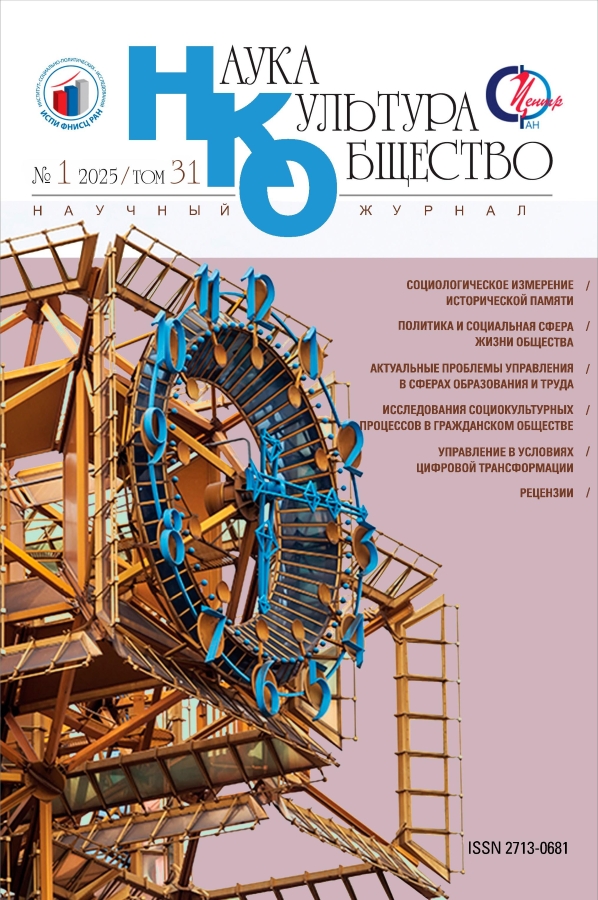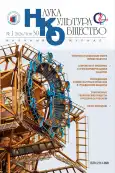Volunteer researchers in modern science: analysing “Nature” publications
- Authors: Galkin K.A.1, Rassolova E.N.1
-
Affiliations:
- Sociological Institute of FCTAS RAS
- Issue: Vol 30, No 1 (2024)
- Pages: 35-45
- Section: MODERN PROBLEMS IN A TRANSFORMING SOCIETY
- URL: https://journal-vniispk.ru/2713-0681/article/view/268374
- DOI: https://doi.org/10.19181/nko.2024.30.1.3
- EDN: https://elibrary.ru/NCUVFE
- ID: 268374
Cite item
Full Text
Abstract
About the authors
Konstantin A. Galkin
Sociological Institute of FCTAS RAS
Email: Kgalkin1989@mail.ru
ORCID iD: 0000-0002-6403-6083
candidate of sociology, senior researcher St. Petersburg, Russia
Elena N. Rassolova
Sociological Institute of FCTAS RAS
Email: enrassolova@gmail.com
ORCID iD: 0000-0003-3637-5544
junior researcher St. Petersburg, Russia
References
- Irwin A. Constructing the scientific citizen: science and democracy in the biosciences. Public understanding of science. 2001;10(1):1–18. doi: 10.1088/0963-6625/10/1/301. EDN JTQBDB.
- Pedersen O. The “Philomaths” of 18th Century England: A Study in Amateur Science. Centaurus. 1963;8(1):238–262. doi: 10.1111/j.1600-0498.1963.tb00555.x.
- Miller-Rushing A., Primack R., Bonney R. The history of public participation in ecological research. Frontiers in Ecology and the Environment. 2012;10(6):285–290. doi: 10.1890/110278.
- Bauer M. W., Allum N., Miller S. What can we learn from 25 years of PUS survey research? Liberating and expanding the agenda. Public understanding of science. 2007;16(1):79–95. doi: 10.1177/0963662506071287. EDN JTRQRV.
- Bodmer W. F., ed. The Public Understanding of Science. Available at: https://royalsociety.org/-/media/policy/publications/1985/10700.pdf (accessed: 01.09.2023).
- van Vliet K., Moore C. Citizen science initiatives: engaging the public and demystifying science. Journal of microbiology & biology education. 2016;17(1):13–16. doi: 10.1128/jmbe.v17i1.1019.
- Bonney R., Phillips T., Ballard H.L., Enck J. W. Can citizen science enhance public understanding of science? Public understanding of science. 2016;25(1):2–16. doi: 10.1177/0963662515607406.
- Riesch H., Potter C. Citizen science as seen by scientists: Methodological, epistemological and ethical dimensions. Public understanding of science. 2014;23(1):107–120. doi: 10.1177/0963662513497324.
- Cappa F., Franco S., Rosso F. Citizens and cities: Leveraging citizen science and big data for sustainable urban development. Business Strategy and the Environment. 2022;31(2):648–667. doi: 10.1002/bse.2942.
- Ostermann‐Miyashita E.-F., Pernat N., König H. J. Citizen science as a bottom‐up approach to address human–wildlife conflicts: From theories and methods to practical implications. Conservation Science and Practice. 2021;3(3):385. doi: 10.1111/csp2.385.
- Волкова А. В. Потенциал «гражданской науки» в общественно-политическом развитии // Социально-политические исследования. 2019. № 1(2). С. 41–50. doi: 10.24411/2658-428X-2019-10337. EDN ZFAUIP.
- Volkova A. V. Potential of «civil science» in social and political development. Social and Political Research. 2019; № (1):41–50. (In Russ.). doi: 10.24411/2658-428X-2019-10337.
- Göbel C., Ottolini L., Schulze A. Science as a lever: the roles and power of civil society organisations in citizen science. In: Vohland K. [et al.] (eds). The science of citizen science. Springer Cham; 2021. P. 331–349. doi: 10.1007/978-3-030-58278-4_17.
- Stilgoe J. Citizen Scientists: reconnecting science with civil society. London: Demos; 2009. 75 p. ISBN 978-1-9066930-12-1.
- Вердиева Н. Н. Взаимосвязь и перспективы развития гражданской науки и волонтерского движения // Problems of the Information Society. 2021. № 1. С. 130–137. doi: 10.25045/jpis.v12.i1.12.
- Verdiyeva N. N. Relationship and development perspectives of citizen science and volunteers’ movement. Problems of the Information Society. 2021;(1):130–137. (In Russ.). doi: 10.25045/jpis.v12.i1.12.
- Cohn J. P. Citizen science: Can volunteers do real research? BioScience. 2008;58(3):192–197. doi: 10.1641/B580303.
- Bautista-Puig N., De Filippo D., Mauleón E., Sanz-Casado E. Scientific Landscape of Citizen Science Publications: Dynamics, Content and Presence in Social Media. Publications. 2019;7(1):12. doi: 10.3390/publications7010012.
- Follett R., Strezov V. An Analysis of Citizen Science Based Research: Usage and Publication Patterns. PLoS ONE. 2015;10(11): e0143687. doi: 10.1371/journal.pone.0143687.
- Kullenberg C, Kasperowski D. What is Citizen Science? A Scientometric Meta-analysis. PLoS ONE. 2016;11(1):e0147152. doi: 10.1371/journal.pone.0147152.
- Lintott C. J., Schwamb M. E., Barclay T., [et al.]. Planet Hunters: New Kepler Planet Candidates from Analysis of Quarter 2. The Astronomical Journal. 2013;145(6):151. doi: 10.1088/0004-6256/145/6/151.
- Бусыгина Т. В. Анализ литературы по проблеме «гражданская наука» на основе базы данных Scopus // Социология науки и технологий. 2022. Т. 13, № 4. С. 169–201. doi: 10.24412/2079-0910-2022-4-169-201. EDN FVOPFU.
- Busygina T. V. An analysis of the literature on citizen science based on Scopus database. Sociology of science and technology. 2022;13(4):169–201. (In Russ.). doi: 10.24412/2079-0910-2022-4-169-201.
- Pelacho M., Ruiz G., Sanz F. [et al.]. Analysis of the evolution and collaboration networks of citizen science scientific publications. Scientometrics. 2021;126(1):225–257. doi: 10.1007/s11192-020-03724-x. EDN XFVUVX.
- Moczek N., Voigt-Heucke S. L., Mortega K. G. [et al.]. A self-assessment of European citizen science projects on their contribution to the UN Sustainable Development Goals (SDGs). Sustainability. 2021;13(4):1774. doi: 10.3390/su13041774.
- Муравьева А. А., Олейникова О. Н. Роль университетов в развитии дискурса гражданской науки // Университетское управление: практика и анализ. 2021. Т. 25, № 3. С. 45–55. doi: 10.15826/umpa.2021.03.026. EDN HVJJWJ.
- Muravyeva A. A., Oleynikova O. N. The universities’ role in developing citizen science discourse. University Management: Practice and Analysis. 2021;25(3):45-55. (In Russ.). doi: 10.15826/umpa.2021.03.026.
- Vohland K., Land-Zandstra A., Ceccaroni L. [et al.] The science of citizen science evolves. In: Vohland K., [et al.] The Science of Citizen Science. Springer, Cham; 2021. doi: 10.1007/978-3-030-58278-4_1.
- Robinson L. D., Cawthray J. L., West S. E. [et al.] Ten principles of citizen science. In: Hecker S. [et al.] eds. Citizen Science: Innovation in Open Science, Society and Policy. UCL Press; 2018. P. 27–40. doi: 10.2307/j.ctv550cf2.9.
- Kariotis T., Borda A., Winkel K., Gray K. Citizen science for one digital health: a rapid qualitative review of studies in air quality with reflections on a conceptual model. Citizen Science: Theory and Practice. 2022;7(1):39. doi: 10.5334/cstp.531. EDN CYLTSV.
- Dickinson J. L., Zuckerberg B., Bonter D. N. Citizen science as an ecological research tool: challenges and benefits. Annual Review of Ecology, Evolution, and Systematics. 2010;41(1):149–172. doi: 10.1146/annurev-ecolsys-102209-144636.
- Mueller M. P., Tippins D., Bryan L. A. The future of citizen science. Democracy and Education. 2011;20(1):2.
- Bonney R., Cooper C., Dickinson J. L. [et al.] Citizen science: a developing tool for expanding science knowledge and scientific literacy. BioScience. 2009;59(11):977–984. doi: 10.1525/bio.2009.59.11.9.
- Wiggins A., Crowston K. From conservation to crowdsourcing: A typology of citizen science. In: 2011 44th Hawaii International Conference on System Sciences. Kauai, HI, USA: IEEE; 2011. P. 1–10, doi: 10.1109/HICSS.2011.207.
- Theobald E. J., Ettinger A. K., Burgess H. K. [et al.] Global Change and Local Solutions: Tapping the Unrealized Potential of Citizen Science for Biodiversity Research. Biological Conservation. 2015;181:236–244. doi: 10.1016/j.biocon.2014.10.021.
- Soroye P., Ahmed N., Kerr J. T. Opportunistic citizen science data transform understanding of species distributions, phenology, and diversity gradients for global change research. Global Change Biology. 2018;24(11):5281–5291. doi: 10.1111/gcb.14358.
- Sullivan B. L., Aycrigg J. L., Barry J. H. [et al.] The eBird enterprise: An integrated approach to development and application of citizen science. Biological Conservation. 2014;169:31–40. doi: 10.1016/j.biocon.2013.11.003.
- Chen C. A Glimpse of the First Eight Months of the COVID-19 Literature on Microsoft Academic Graph: Themes, Citation Contexts, and Uncertainties. Frontiers in Research Metrics and Analytics. 2020;5:607286. doi: 10.3389/frma.2020.607286.
- Liu W., Zhang H., Wang Q. [et al.] A review and scientometric analysis of global research on prefabricated buildings. Advances in Civil Engineering. 2021;2021: 8869315. doi: 10.1155/2021/8869315.
- Vigneshkumar C., Salve U. R. A scientometric analysis and review of fall from height research in construction. Construction Economics and Building. 2020;20(1):17–35. doi: 10.5130/AJCEB.v20i1.6802.
Supplementary files











